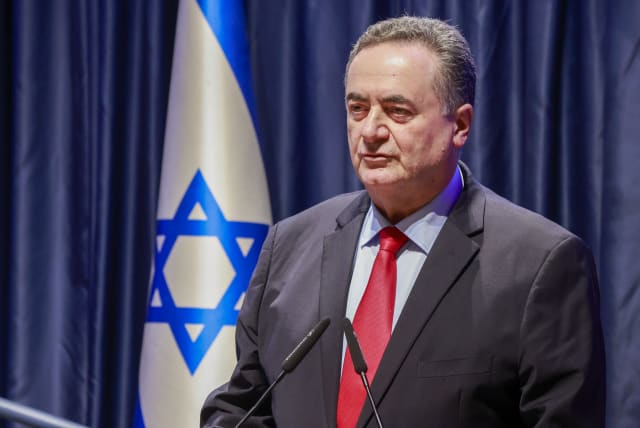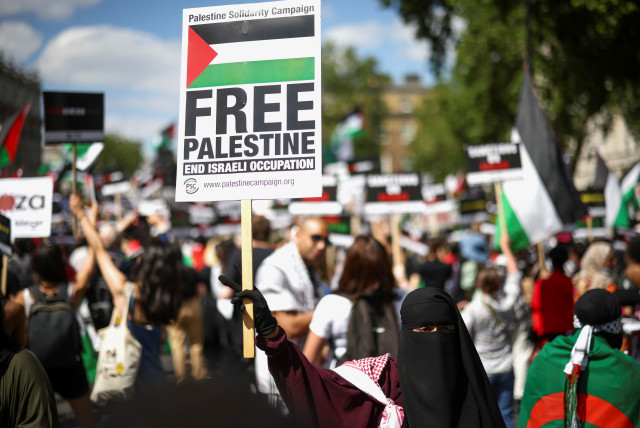Katz warns 'we're in the middle of WWIII' on first day as foreign minister
“This doesn’t look like WWI or WWII,” he said, explaining that Israel was in the forefront of this war, “we are there for everyone.”


World War III against the dangerous radical Islamic belief perpetuated by Iran has already begun, newly installed Foreign Minister Israel Katz said on Tuesday as he began his first day of work.
“We’re in the middle of World War III against Iran lead radical Islam, whose tentacles are already in Europe,” Katz said. He spoke ceremony in the Ministry, in which employees welcomed his return to an office he left in 2020 after holding the post for a year.
Katz noted that he had left amid the COVID-19 pandemic and returned in the middle of a war, not just against Hamas, but also against a violent radical ideology.
“This doesn’t look like WWI or WWII,” he said, explaining that Israel was in the forefront of this war, “we are there for everyone.”
“We’re in the middle of World War III against Iran lead radical Islam, whose tentacles are already in Europe,”
Foreign Minister Israel Katz

Israel is not alone here, he said, as he explained that Israel was at the front of a war, that also placed moderate Arab states against Iran.
He blamed the Islamic Republic for Hamas’s October 7 attack on Israel, explaining that the terror group had sought to thwart the completion of a Saudi peace with the Jewish state.
“We were in the middle of a dream” of regional peace and “that is why Iran did what it did,” he said.
Even antisemitism has become connected to this larger war, Katz said, as are Israel’s battles with Iranian proxy groups, Hamas in the south and Hezbollah in the north.
Free hostages is top priority
Katz set freeing the 129 hostages in Gaza, who had been seized in the Hamas-led attack on October 7, as his top priority goal.
“The first thing, my top priority is the activity of this office to bring the hostages home,” said Katz, noting that as diplomates the ministry has the potential to advance their release.
“We will employ global pressure” toward this objective, Katz said. Upholding Israel’s diplomatic legitimacy to battle Hamas and Hezbollah will be the ministry’s second priority, he said.
The third and connected objectives, Katz said. is to apply diplomatic pressure that would force Hezbollah to withdraw from Israel’s northern border, including through the implementation of United Nations Security Council Resolution 1701 which mandates that move.
Following that, Katz said, is halting the threat from Iran’s drive to produce nuclear weapons and to use its proxy groups, including the Houthis, to attack Israel through conventional methods.
Katz said that despite this, he was determined to advance regional peace, as he noted that he had brought with him from his past office as Minister of Energy and Infrastructure a map of the plan he had initiated at least as far back as 2018 for a regional rail line that would connect Israel to the region. Katz recalled that also had planned for a sea route for Gaza cargo, a move that is more important now given that Israel no longer wants to supply Gaza with goods and utilities.
Before Katz took the podium, Eli Cohen who had served as Foreign Minister for the last year, summed up his work during that time.
The Ministry later sent out a list of his achievements. There were 65 bilateral meetings held with foreign ministers or heads of state, of which, included 36 overseas visits.
Nine business delegations were sent abroad to strengthen economic ties.
Cohen also worked to promote Israel’s entry in September into the United States’ visa-free program.
There were 30 world leaders and foreign ministers who made solidarity visits to Israel in the aftermath of the October 7 attack. They toured the southern communities that had been attacked and met with families of the captives.
Cohen personally led abroad five delegations of relatives of the hostages, including to the European Union and the United Nations, as well as to the International Committee of the Red Cross headquarters in Geneva.
He resolved two diplomatic crises with ally countries Poland and Serbia and oversaw the opening of Israeli embassies in Azerbaijan, the first one in a Shia Muslim country and Turkmenistan, ten kilometers from the Iranian border, Cohen said.
During his time as Foreign Minister, Oman agreed to allow Israeli planes to fly over its airspace even though the two countries do not have diplomatic relations. Israel also signed a free trade agreement with the United Arab Emirates and Cohen visited Sudan to help advance the completion of its normalization deal with Israel. He also was the highest level Israeli to visit Kyiv, traveling there in February.
In describing the last three months under fire, Cohen said that Israel has received more support than was imagined.
One can count on one’s hand, the number of Western countries who are calling for a permanent ceasefire, he said.
Cohen highlighted the Biden administration’s support for Israel at the United Nations, particularly the Security Council.
“All this is due to the hard work of the employees of this Ministry,” he said.
More than any other Ministry, this one wrests most squarely on the employees within it. “To be a diplomat is challenging and doubly so to be an Israeli one,” he said.





.jpeg)
Comments
Post a Comment